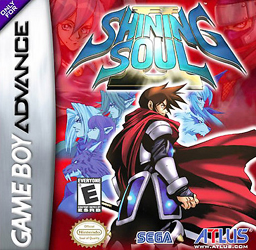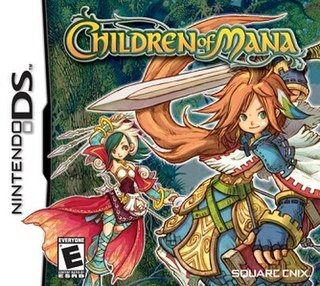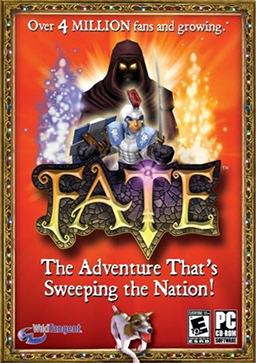A massively multiplayer online role-playing game (MMORPG) is a video game that combines aspects of a role-playing video game and a massively multiplayer online game.

A role-playing video game, role-playing game (RPG) or computer role-playing game (CRPG) is a video game genre where the player controls the actions of a character immersed in some well-defined world, usually involving some form of character development by way of recording statistics. Many role-playing video games have origins in tabletop role-playing games and use much of the same terminology, settings, and game mechanics. Other major similarities with pen-and-paper games include developed story-telling and narrative elements, player character development, complexity, as well as replay value and immersion. The electronic medium removes the necessity for a gamemaster and increases combat resolution speed. RPGs have evolved from simple text-based console-window games into visually rich 3D experiences.
In tabletop games and video games, a character class is an occupation, profession, or role assigned to a game character to highlight and differentiate their capabilities and specializations.

Ragnarok Online is a massive multiplayer online role-playing game (MMORPG) created by Gravity based on the manhwa Ragnarok by Lee Myung-jin. It was released in South Korea on 31 August 2002 for Microsoft Windows. The game has spawned an animated series, Ragnarok the Animation, and a sequel game, Ragnarok Online 2: Legend of the Second. The player's characters exist in a world with a player environment that includes NPC's that can be interacted with, and creatures spawning in maps that need to be defeated to level-up and to acquire items.

Dungeon Siege II is an action role-playing video game, the sequel to 2002's Dungeon Siege. It was developed by Gas Powered Games and released in 2005. The story is a continuation of the Dungeon Siege storyline. An expansion Broken World was released in 2006.

Shining Soul II is an action role-playing game for the Game Boy Advance. It was developed by Grasshopper Manufacture, as the sequel to Shining Soul and part of the Shining series.
Hate is a mechanism used in many MMORPGs, as well as in some RPGs, by which mobs prioritize which characters to attack. The player who generates the most hate on a mob will be preferentially attacked by that mob. The act of initiating such situation is called "getting aggro" or "pulling aggro."

Children of Mana is a 2006 action role-playing game for the Nintendo DS handheld console. It was developed by Square Enix and Nex Entertainment, and published by Square Enix and Nintendo. It is the sixth game of the Mana series—following 2003's Sword of Mana—and the first entry in the World of Mana subseries. Set in a high fantasy universe, Children of Mana follows one of four young heroes as they combat an invasion of monsters and learn about the cataclysmic event that killed their families.

Ragnarok is a freeware Roguelike video game for MS-DOS, developed by Norsehelm Productions from 1992 to 1995.
The fighter is one of the standard playable character classes in the Dungeons & Dragons fantasy role-playing game. A fighter is a versatile, weapons-oriented warrior who fights using skill, strategy and tactics.
The Ranger is one of the standard playable character classes in most editions of the Dungeons & Dragons fantasy role-playing game. Rangers are skilled bushcraftsmen/woodcraftsmen, and often lived reclusive lives as hermits.
The rogue, formerly known as the thief, is one of the standard playable character classes in most editions of the Dungeons & Dragons fantasy role-playing game. A rogue is a versatile character, capable of sneaky combat and nimble tricks. The rogue is stealthy and dexterous, and in early editions was the only official base class from the Player's Handbook capable of finding and disarming traps and picking locks. The rogue also has the ability to "sneak attack" enemies who are caught off-guard or taken by surprise, inflicting extra damage.
The barbarian is a playable character class in the Dungeons & Dragons fantasy role-playing game. The class was introduced in 1985 and went through a number of variations in subsequent editions of the game.

Fate is a 2005 single-player action role-playing game originally released for the PC by WildTangent. Fate was released for the PC Steam client on December 12, 2013. Three sequels—titled Fate: Undiscovered Realms, Fate: The Traitor Soul and Fate: The Cursed King—were released in 2008, 2009 and 2011 respectively.

Monato Esprit is a 3D, fantasy-themed massively multiplayer online role-playing game. The game is currently in the open beta stage of development and was released in July 2009. Monato Esprit is free to download and uses the e-currency "MetaTIX" as its billing system.
In video games, a raid is a type of mission in Massively multiplayer online role-playing games (MMORPGs) where a much larger number than usual of people specifically gather in an attempt to defeat either: (a) another number of people at player-vs-player (PVP), (b) a series of computer-controlled enemies in a player-vs-environment (PVE) battlefield, or (c) a very powerful boss (superboss). This type of objective usually occurs within an instance dungeon, a separate server instance from the other players in the game. A raid may be highly planned and coordinated or arise nearly spontaneously through word of mouth communications in- and out-of game.
A healer is a type of character class in video gaming. When a game includes a health game mechanic and multiple classes, often one of the classes will be designed around the restoration of allies' health, known as healing, in order to delay or prevent their defeat. Such a class can be referred to as a healer. In addition to healing, healer classes are sometimes associated with buffs to assist allies in other ways, and nukes to contribute to the offense when healing is unnecessary.

Cabal Online is a free-to-play, 3D massively multiplayer online role-playing game developed by South Korean company ESTsoft. Different localizations of the game exist for various countries and regions. Although free-to-play, the game makes use of the freemium business model by implementing an "Item Shop", both in-game and via web, allowing players to purchase special premium coins using real currency, in order to acquire exclusive game enhancements and features, useful items and assorted vanity content.

Puzzle & Dragons is a puzzle video game with role-playing and strategy elements, developed and published by GungHo Online Entertainment for the iOS, Android, and Amazon Fire platforms.
Since the origin of video games in the early 1970s, the video game industry, the players, and surrounding culture have spawned a wide range of technical and slang terms.









